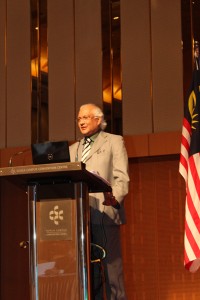Corruption is a major obstacle to poverty alleviation-says SL’s corruption- buster
View(s):Corruption not only results in underperforming economies, especially in developing countries, but it is also a major obstacle to poverty alleviation and development efforts, according to Sri Lankan public interest activist and main corruption-buster Nihal Sri Ameresekere.
He made these comments as a part of a presentation entitled “On Corruption & Integrity; Codes of Conduct & Enforcement”, at the annual conference of the International Association of Anti-Corruption Authorities, which was recently held in Malaysia.

Nihal Sri Ameresekere
Elaborating, he further quoted former US Treasury Secretary Robert Rubin as stating; “Corruption hurts the poor disproportionately by diverting funds intended for development, undermining a Government’s ability to provide basic services, feeding inequality and injustice and discouraging foreign aid and investment”.
In addition, he also re-iterated Mr. Rubin’s 1999 sentiments that “Developed countries must deal directly with their own involvement in developing country corruption. Corruption is a two way street and for every bribe taker, there is a bribe giver… While most of the OECD have ended the tax deductibility of bribes, there are still several OECD countries that have not, and they should do so forthwith ….”
Further, Mr. Ameresekere also highlighted several on-the-ground realities to be further considered before corruption was left alone to thrive. And he also talked about how it tied in with global rife and man-made catastrophes such as terrorism, etc.
Firstly; “Is it not a curious paradox, that schemes and designs to replace, such pillaged and plundered property of the poor people, through ‘poverty alleviation programs’, ironically are financed from the very funds of the poor people or by debts to be re-paid by them or their future generations?”
Alternatively; “Denying the impoverished helpless vast majority of poor people equitable social justice, does it not ultimately lead to disillusionment, alienation, frustration, social unrest, insurrection and justifiable rebellion?”
Spotlighting the root causes of terrorism, Mr. Ameresekere further argued; “Should not the pillage and plunder of the property of the poor people, referred to as ‘economic terrorism’, perpetrated by ‘economic terrorists’, condemned internationally in contemporary times, be first dealt with, as the root cause for the germination of terrorism?”
Additionally, he also added; “does not therefore, the pillage and plunder of the resources of the poor people, consequently result in armed struggles and armed terrorism, with brutal counter offensives by the international community, to destroy such terrorism?”
And; “Ironically, do not such brutal counter-offensives, with the utilization of further resources of the poor people, which consequently give rise to despicable violations of human-rights, with concerns of humanity righteously transcending parochial interests of nationality, justifiably raise international concerns, however, at a very belated stage?”
(JH)
Follow @timesonlinelk
comments powered by Disqus



















